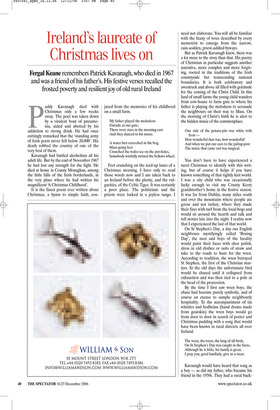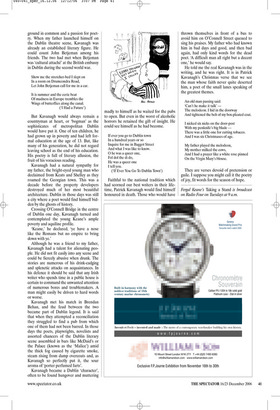Ireland’s laureate of Christmas lives on
Fergal Keane remembers Patrick Kavanagh, who died in 1967 and was a friend of his father’s. His festive verses recalled the frosted poverty and resilient joy of old rural Ireland Paddy Kavanagh died with Christmas only a few weeks away. The poet was taken down by a virulent bout of pneumonia, aided and abetted by his addiction to strong drink. He had once cuttingly remarked that the ‘standing army of Irish poets never fell below 20,000’. His death robbed the country of one of the very best of them.
Kavanagh had battled alcoholism all his adult life. But by the end of November 1967 he had lost any strength for the fight. He died at home in County Monaghan, among the little hills of the Irish borderlands, in the very place where he had written his magnificent ‘A Christmas Childhood’.
It is the finest poem ever written about Christmas, a hymn to simple faith, con jured from the memories of his childhood on a small farm.
My father played the melodeon Outside at our gate; There were stars in the morning east And they danced to his music.
A water hen screeched in the bog, Mass-going feet Crunched the wafer-ice on the pot-holes, Somebody wistfully twisted the bellows wheel.
Feet crunching on the iced-up lanes of a Christmas morning. I have only to read those words now and I am taken back to an Ireland before the plenty, and the vulgarities, of the Celtic Tiger. It was certainly a poor place. The politicians and the priests were locked in a joyless tango. I need not elaborate. You will all be familiar with the litany of woes described by every memoirist to emerge from the narrow, rain-sodden, priest-addled byways.
But as Patrick Kavanagh knew, there was a lot more to the story than that. His poetry of Christmas in particular suggests another narrative, more complex and more forgiving, rooted in the traditions of the Irish countryside but transcending national boundaries. It is both celebratory and awestruck and above all filled with gratitude for the coming of the Christ Child. In this land of small farms the young child wanders from cow-house to farm gate to where his father is playing the melodeon to serenade the neighbours on their way to Mass. On the morning of Christ’s birth he is alert to the hidden music of the commonplace.
One side of the potato-pits was white with frost How wonderful that was, how wonderful! And when we put our ears to the paling-post The music that came out was magical.
You don’t have to have experienced a rural Christmas to identify with this writing, but of course it helps if you have known something of that tightly knit world. I was a city child who was occasionally lucky enough to visit my County Kerry grandmother’s home in the festive season. It was far from Dublin, many miles south and over the mountains where people ate goose and not turkey, where they made their fires with turf from the local bogs and would sit around the hearth and talk and tell stories late into the night. I realise now that I experienced the last of that world.
On St Stephen’s Day, a day our English neighbours mystifyingly called ‘Boxing Day’, the men and boys of the locality would paint their faces with shoe polish, dress in old clothes or suits of straw and take to the roads to hunt for the wren. According to tradition, the wren betrayed St Stephen, the first of the Christian martyrs. In the old days the unfortunate bird would be chased until it collapsed from exhaustion and was then tied to a pole at the head of the procession.
By the time I first saw wren boys, the chase had become purely symbolic, and of course an excuse to sample neighbourly hospitality. To the accompaniment of tin whistles and bodhráns (hand drums made from goatskin) the wren boys would go from door to door in search of porter and Christmas pudding with a song that would have been known in rural districts all over Ireland.
The wren, the wren, the king of all birds, On St Stephen’s Day was caught in the furze, Although he is little, his family is great, I pray you, good landlady, give us a treat.
Kavanagh would have heard that song as a boy — as did my father, who became his friend in the 1950s. They had a rural back ground in common and a passion for poetry. When my father launched himself on the Dublin theatre scene, Kavanagh was already an established literary figure. He could count John Betjeman among his friends. The two had met when Betjeman was ‘cultural attaché’ at the British embassy in Dublin during the second world war.
Show me the stretcher-bed I slept on In a room on Drumcondra Road, Let John Betjeman call for me in a car.
It is summer and the eerie beat Of madness in Europe trembles the Wings of butterflies along the canal.
(‘I Had a Future’)
But Kavanagh would always remain a countryman at heart, or ‘bogman’ as the sophisticates of metropolitan Dublin would have put it. One of ten children, he had grown up in poverty and had left formal education at the age of 13. But, like many of his generation, he did not regard leaving school as the end of his education. His poetry is full of literary allusion, the fruit of his voracious reading.
Kavanagh had a natural sympathy for my father, the bright-eyed young man who declaimed from Keats and Shelley as they roamed the Georgian town. This was a decade before the property developers destroyed much of her most beautiful architecture. Dublin in those days was still a city where a poet would find himself bidden by the ghosts of history.
Crossing O’Connell Bridge in the centre of Dublin one day, Kavanagh turned and contemplated the young Keane’s ample poverty and aquiline profile.
‘Keane,’ he declared, ‘ye have a nose like the Romans but no empire to bring down with ye.’ Although he was a friend to my father, Kavanagh had a talent for alienating people. He did not fit easily into any scene and could be fiercely abusive when drunk. The stories are numerous of his drink-cadging and splenetic attacks on acquaintances. In his defence it should be said that any Irish writer who spends time in a public house is certain to command the unwanted attention of numerous bores and troublemakers. A man might easily be driven to hard words or worse.
Kavanagh met his match in Brendan Behan, and the feud between the two became part of Dublin legend. It is said that when they attempted a reconciliation they struggled to find a pub from which one of them had not been barred. In those days the poets, playwrights, novelists and assorted chancers of the Dublin literary scene assembled in bars like McDaid’s or the Palace (known as the ‘Malice’) amid the thick fog caused by cigarette smoke, steam rising from damp overcoats and, as Kavanagh so perfectly put it, the sour aroma of ‘porter perfumed farts’.
Kavanagh became a Dublin ‘character’, often to be found hungover and muttering madly to himself as he waited for the pubs to open. But even in the worst of alcoholic horrors he retained the gift of insight. He could see himself as he had become.
If ever you go to Dublin town In a hundred years or so Inquire for me in Baggot Street And what I was like to know.
O he was a queer one, Fol dol the di do, He was a queer one I tell you.
(‘If Ever You Go To Dublin Town’)
Faithful to the national tradition which had scorned our best writers in their lifetime, Patrick Kavanagh would find himself honoured in death. Those who would have thrown themselves in front of a bus to avoid him on O’Connell Street queued to sing his praises. My father who had known him in bad days and good, and then bad again, had only kind words for the dead poet. ‘A difficult man all right but a decent one,’ he would say.
He told me the real Kavanagh was in the writing, and he was right. It is in Patrick Kavanagh’s Christmas verse that we see the man whose faith never quite deserted him, a poet of the small lanes speaking of the greatest themes.
An old man passing said: ‘Can’t he make it talk’ The melodeon. I hid in the doorway And tightened the belt of my box-pleated coat.
I nicked six nicks on the door-post With my penknife’s big blade There was a little one for cutting tobacco. And I was six Christmases of age.
My father played the melodeon, My mother milked the cows, And I had a prayer like a white rose pinned On the Virgin Mary’s blouse.
They are verses devoid of pretension or guile. I suppose you might call it the poetry of joy, fit words for the season of hope.
Fergal Keane’s Taking a Stand is broadcast on Radio Four on Tuesdays at 9 a.m.







































































































































 Previous page
Previous page